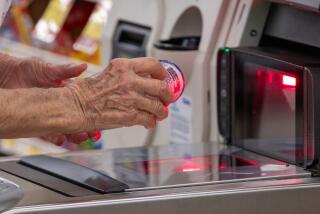Computers Are Running Us, Not Vice Versa
- Share via
High tech is supposed to make our lives easier. It has brought us cars that talk to us when the door’s ajar and when we forget and leave the lights on. It has produced cameras that do everything but click the picture. Computers churn out our paychecks; they even help churn out this newspaper.
Yet too often it seems that far from making things easier, technology is just complicating our existence. In short, we get the impression that computers are running us instead of our running them.
One good example is evident in almost any department store. In the good old days, you stopped at Sears to buy a bolt of cloth, paid your money and off you went. A couple of times a year, the store would close for an afternoon to take inventory.
Things have advanced considerably since then. Stores don’t need to close because they keep a running inventory. Computers have brought to the salesclerks’ fingertips the ability to do a lot of what the stores used to handle in the back office.
There’s just one problem. What’s good for the store may not be so good for the customer. Go buy that bolt of cloth now, in a hurry to get to the next department, and you stand there while the salesperson punches buttons.
Pretty soon you’re looking at your watch. It probably doesn’t take as long as it seems, but it takes a lot longer than it should.
I recently asked a cashier at one suburban store just how many buttons she had to push for the average transaction. Several minutes later she still hadn’t responded, so I asked again.
“Hold on,” she said, “I’m still counting.”
Turns out the answer was 41. And if she made a mistake on, say, the 37th, “I have to punch three more to clear the machine and then start over.”
Don’t blame it on credit cards. Pay cash and it’s still 41. And woe to the customer who arrives just as the computer system goes down.
Maybe it’s time some store upstaged its competitors and did all the back-office work on its own time instead of the customer’s.
In another arena, computers have brought big changes to banking, some good, some not so good. It’s certainly quicker to go to the automatic teller, although many customers miss a little personal attention and have fewer and fewer branches at which to get it.
Cost-conscious bankers, however, want to take electronic banking as far as possible. If you don’t read some of the small-print announcements they send with the monthly statement, for example, you probably missed the decision to stop sending you back your checks with the statement unless you requested it. If you did accept the idea of no check return, the bank reassures you that you can always request copies later.
A friend of mine suddenly realized his handiwork wasn’t coming back and demanded those back copies. What he got was a strange set of photocopies not only of his own checks but of other people’s as well. The bank, probably a little computer happy, has managed to turn its cost-saving efforts into real potential for invasion of privacy.
It seems that checks aren’t categorized by customer any longer but rather by the order in which the checks--all checks from everybody who does business with the bank--arrive at the bank for payment.
So my friend’s checks weren’t in nice order but rather mixed in with whatever happened to arrive at the same time. And what he got as copies were photocopies of a couple of checks to a page, his and the next one on the microfilm tape.
Sooner or later a customer of the bank is going to be a neighbor of the other guy whose check he gets to see.
Then watch the fun.
Department stores and banks point up one of the biggest risks of this emerging computer age--instead of letting the machines simplify things, we insist on programming them to do too much. They’re supposed to reduce paper work, for instance, and yet we use them to generate reports on all sorts of things that we didn’t pay much attention to in the past and probably don’t need to now.
The next step, we’re told, is artificial intelligence. Maybe we should try some of the real stuff first.
More to Read
Inside the business of entertainment
The Wide Shot brings you news, analysis and insights on everything from streaming wars to production — and what it all means for the future.
You may occasionally receive promotional content from the Los Angeles Times.










